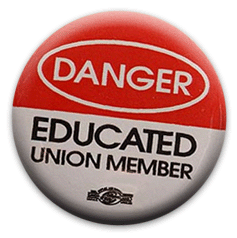
The answer to my own wonky question is "yes". Sunday's electoral victory by the right-wing "Alliance" of four parties was a defeat for the valliant but tired Social Democratic Party. It was not a defeat for Social Democracy. Still, it's not a good thing. While the new majority is somewhat slim (7 seats), it will likely survive a full term. They'll do some damage, on integration questions, on macro-economics, labor rights and probably foreign policy.
However, their victory required a major concession: the acceptance of the basic governing tenants of Social Democracy. In fact, the conservative Moderate Party, the dominant player in the Alliance, campaigned, Blair style, as "the New Moderates". Their move to the center brought in middle and working class votes that would not have been theres had they stuck to their traditional neoliberal talking points.
Nonetheless, even though the mandate is small at the national level, it was a mandate. In fact, at the local level, (local and national elections were held simultaneously) the Moderates took control of scores of city and regional governments, including Stockholm and Gothenburg. While the Social Democrats did perform better than was expected several months ago, the Moderates' surge in popularity was decisive.
There were interesting trends among the smaller parties, as well. Neither the Social Democrats nor the Moderates will ever recieve enough votes to govern absolutely. The Social Democrats rely on the "toleration" of the sometimes quixotic Greens and the Left Party. Neither minor party is allowed into the Government, so it is not technically a Coalition. While the Greens perennially make noise of breaking with the Social Democrats, they always end up listening to their base and voting in a minority Social Democratic government. The Left Party can also be a pain in the ass. Shortly after the last election, their popular and quite strategic was forced to resign due to a personal tax scandal. Her replacement, from the paleoleft faction of the party, decided to announce last year that he was, in fact, a "Communist." Then he recanted, becoming the only thing worse than a Communist in Swedish politics: a disloyal, dishonest Communist. Their vote was down considerably this time around.
In Sweden, Right Wing governments are always true coalitions, led most times by the Moderates, but with government ministers from the other so-called "bourgeois" parties: the liberal People's Party, the agrarian Center Party and the Christian Democrats. The People's Party has also participated in governments of the left, and include a healthy faction of left-leaning "social liberals" (these folks are probably the closest to our Democratic Party in Sweden). In the last elections, the liberals did very well by moving to the right on immigration and integration questions. It was a craven move, but it paid off. For the first time, it seemed that the People's Party would be the new leading party of the right. This year, they got caught spying on the Social Democrats. They lost a lot of ground.
It was the Moderate Party who were back in the forefront, and their leader, Fredrik Reinfeldt, is the new Prime Minister. Right wing governments don't usually last long in Sweden. Generally they try too hard, and over-extend their mandate. The fact that they are always coalitions makes them even more unstable: the Christian and agrarian vote won't let them go after the Welfare State too aggressively and the liberals demand radical moves on social issues. Not an easy recipe for a coherent strategy for governance.
But this new "Alliance" seems a bit more disciplined and truly eager to govern. They have resonated the same themes on the campaign trail, they've stuck to the script, and they seem to have hammered out key turf issues well in advance. Most importantly, they've campaigned as centrists, as modernizers, as having accepted the basic Swedish lay of the land. They are, in that sense, akin to our own Governor here in California. We know that he has proven much more difficult to beat, even though his agenda is usupported by the majority of Californians. He's a "moderate" Republican. Nonetheless, he continues to sneak right wing policies quietly past the goalie. Beware these "moderates", old or new.
The Social Democrats and the rest of the Swedish left needs to do some serious thinking whilst sitting in opposition. It's possible that this bunch can't be counted on to simply lose the next election for us. The next one will have to be
won.
Here are the results, via our friends at The Daily:
Percentage vote on the left, Riksdag seats on the right, change in brackets.
Left Party 5.8% (-2.5%) 22 (-8)
Social Democrats 35.2% (-4.8%) 130 (-14)
Greens 5.2% (+0.6%) 19 (+2)
Total Left bloc 46.2% (-6.7%) 171 (-20)
Centre Party 7.9% (+1.7%) 29 (+7)
Liberal Party 7.5% (-5.9%) 28 (-20)
Christian Democrats 6.6% (-2.5%) 24 (-9)
Moderate Party 26.1% (+10.9%) 97 (+42)
Total Bourgeois bloc 48.1% (+4.2%) 178 (+20)
Others 5.7% (+2.6%) 0 (-)
Etiketter: international










